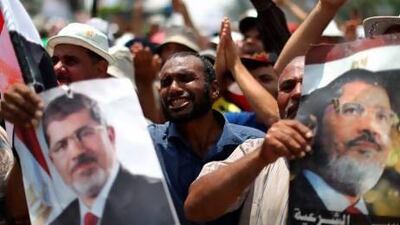CAIRO // After decades of meeting in secret, May 21, 2011, marked the Muslim Brotherhood's coming-out ceremony.
With a grand stage full of musicians and hundreds of cheering supporters, the group's top leadership stood before their freshly painted new headquarters.
The Brotherhood had been late joining the uprising that forced the resignation of Hosni Mubarak, the president whose all-seeing security apparatus monitored the banned organisation's every move. But since Mubarak's downfall three months earlier, the group's stock had soared.
Its vast social-welfare network and presence in communities across the country were being rewired to form the most powerful political force in the new Egypt.
Its old headquarters was a collection of offices in a damp, nondescript building in the quiet Garden City in Cairo. The new one was a tall building perched near the edge of the storied cliffs of Moqattam, Cairo's highest point.
But if the inaugural event for its headquarters in 2011 exemplified the Brotherhood's new-found influence, its current state shows how far it has fallen. Groups of protesters last week laid siege to the building, breaking nearly every window and destroying the interior.
A visit to the modern six-storey building on Sunday found it completely abandoned and covered in scorch marks as a group of police idly looked on. A conference room could be seen from the street, its light fixtures dangling and air-conditioning units hanging by their cords.
The men who once held court in its offices as dignitaries, businessmen and even rival politicians who paid visits are either in detention or hiding. Mohammed Morsi, the long-time Brotherhood deputy leader who became Egypt's first freely elected president, is being held by the military after being removed from power on July 3.
"We are, unfortunately, used to this kind of repression," said Khaled Hanafi, secretary of the Freedom and Justice Party, the Brotherhood's political wing. "The army and police are kidnapping our people, harassing families and killing supporters."
After 51 people were killed and more than 400 injured on Monday morning in a clash between pro-Morsi supporters and security forces, the emotions of Brotherhood leaders have become even more existential. They called the bloodletting a "massacre" perpetrated by the army and police, while senior generals and police said they opened fire only after masked militants attacked a government building.
The only thing clear when the dust settled and the victims were laid to rest was that it was the deadliest incident of violence since the uprising against Mubarak two and a half years ago when black-clad riot police fought street battles against throngs of demonstrators.
Amr Darrag, another Freedom and Justice Party official, warned on Monday that Egypt could become a new Syria if the army did not reverse its actions against Mr Morsi. Present in his voice was palpable exasperation, but also the sense that the Brotherhood had no plans to disappear after power was taken from it so dramatically.
"The only option is to keep protesting peacefully," he said. "We can't stand by while this is happening."
There is, however, little in the way of thoughtfulness from Brotherhood members about how the organisation managed to fall so low in the course of a few months. The removal of Mr Morsi from power was unexpected, but it was not sudden.
"They feel like they went along with the democratic process and when they won, other groups denied their victory," said Saad Eddin Ibrahim, the head of the Ibn Khaldun Centre for Development Studies who was imprisoned alongside Mr Morsi during Mubarak's regime for criticising the government.
"Of course, at the same time, they do not engage in any self-criticism or reflect on their performance in power."
From the perspective of the army, the Brotherhood's political blindness was confirmed by Mr Morsi's final defiant speech. Waving his hands angrily and using the word "legitimacy" more than 70 times on July 2, he called on Egyptians to resist a conspiracy by remnants of the Mubarak regime and anti-democratic forces.
Twenty-four hours later, television screens across the nation were displaying an extraordinary press conference. Gen Abdel Fatah El Sisi, the defence minister, speaking in grave tones, announced that Mr Morsi had been deposed and the constitution suspended.
The fact that Ahmed El Tayyeb, the grand sheikh of Al Azhar, Egypt's highest religious authority, and a representative of the ultraconservative Al Nour party were by Gen El Sisi's side showed that the Brotherhood had gone so far as to alienate just about everyone in the political scene.
The popular anger against Mr Morsi was rooted in a series of poorly thought-out decisions, but most resonant across Egypt's spectrum of ideologies and beliefs was the simple complaint that he had not made any progress in improving daily life in Egypt.
Protesters in 2011 cried "Bread, Justice, Freedom" in their chants. Yet, instead of addressing these core issues, Mr Morsi instead responded by consolidating power, interfering with the judiciary and rushing through a vote on a constitution designed by Islamists to curtail freedoms demanded by the masses.
The deadlock caused by these actions hamstrung the economy, leading to further joblessness, higher food prices and chronic fuel shortages.
The Mubarak regime managed to survive for nearly three decades, thanks to a strong security apparatus, but also to an unwillingness to undertake dramatic reforms. Mr Morsi's presidency fell apart in a single year because it was ambitious in all the wrong ways.
twitter: For breaking news from the Gulf, the Middle East and around the globe follow The National World. Follow us

